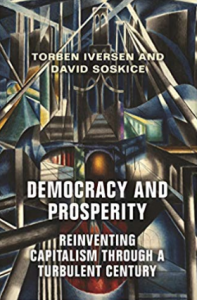
Capitalism is the best economic system


Torben Iversen, a Danish political science and professor and David Soskice, British economist and professor at the London School of Economics addresses does capitalism conflict with democracy with a resounding “no”, Not only capitalism work, it is also the only economic system that works and insists that democracy and the advanced market economy are symbiotic. This combination has, they argue in democracy and prosperity, proved astonishingly successful over the past century and in all probability, will continue to be so.
They argue their points in three stages, the first, the state is central in an advanced economy, government needs to ensure companies are subject to competition, workers are co-operative, the population is adequately educated and trained, the research that drives technological advance is funded and the infrastructure on which the economy depends is built. It is always the market with the state not market against the state.
Second, in an advanced economy, the educated and the aspiration are a large and highly politically engaged element of the population. Such people naturally vote for parties and people they think consider economically competent.
Finally the skills on which advanced businesses and advanced economies depend are embedded in networks of people who live in specific locations. Companies are, as a result, quite immobile. Only the less skilled parts of their operations are footloose.
They argue that capital is far less footloose than some suppose core activities are geographically specific with each advanced democracy gaining from the skills of the others, via globalisation. They also suggest that democratic governments are compelled to provided businesses with what they need to succeed, while businesses are, in turn, unable to escape taxes and regulations democratically elected governments choose to impose, despite the conventional wisdom to the contrary.
Democracy is stable so long as governing parties are able to satisfy the bulk of the middle classes, which will insist they gain a good share of rising prosperity. This is however, quite consistent with persistent indifference to the fate of the relatively poor.
For over a century entry into the advanced group has only occurred in the instances of Singapore, South Korea, Taiwan, Israel, Ireland and Hong Kong, as these small countries with exceptional characteristics – strong, determined governments and unusual human resources. China may also achieve this. The main obstacle to success has been the difficulty of creating “ large knowledge-intensive sectors sustained by internally driven innovation”.
Each advanced democracy has different clusters of skills connected to different clusters of businesses, with most of relevant knowledge, tactically embedded in the labour force, rather than in the companies.
The authors argue the connection of democracy with advanced capitalism, comes from the fact that the decisive voters will insist on their country’s economic success based on their earnings and the prospective earnings of their children, as well as of the funding of desired public services. So democracy propels economic success forward. Industrialisation and democracy were intimately linked since industrialisation required a more educated population and in the latter, in turn demanded political say.
The unhappy classes of today are, a problem for democracy, rather than a threat to it. Artificial intelligence might destroy the economic advantages of today’s localised networks of skilled human beings. Silicon Valley or the City of London might become a network of machines which could be located anywhere in the world. The people at the top of the income distribution might pull away decisively from everybody else and may be able to poison the competitive wellspring of advanced capitalism through their ability to fund populist campaigns in the name of left behind.
Capitalism is the best economic system just a democracy is the best political one as the two have worked together in advanced capitalist democracies for a long time, with each tempering the weakness and buttressing the strengths of the other.
Democracy and Prosperity: Reinventing Capitalism through a Turbulent Century by Torben Iversen and David Soskice, Princeton $29.95/£24, 360 pages.
